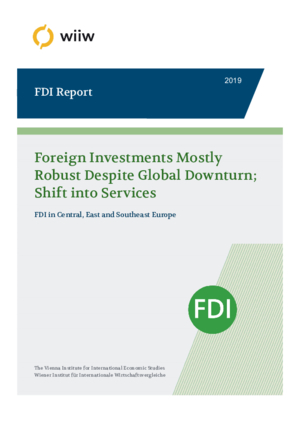Foreign Investments Mostly Robust Despite Global Downturn; Shift into Services. FDI in Central, East and Southeast Europe
Amat Adarov, Mahdi Ghodsi, Gabor Hunya and Olga Pindyuk
wiiw FDI Report No. 2019-06, June 2019
71 pages including 25 Tables and 20 Figures
Foreign direct investment (FDI) inflows to Central, East and Southeast Europe (CESEE) declined by 13% in 2018. The decline was almost exclusively on account of lower inflows into Russia, which halved compared with 2017. Inflows to the new EU Member States (EU-CEE11) were largely unchanged from the previous year, despite strong economic growth. By contrast, inflows into the Western Balkans rose by 28%, thanks in particular to rising investor interest in Serbia and North Macedonia. Turkey received a bit more FDI than in 2017, but the overall amount is still very low relative to the size of the economy.
The decline in FDI to Russia in 2018 was particularly striking. Russia is becoming more and more inward looking, due to the exchange of sanctions with the West and (related) import-substitution economic policies. Efforts to stimulate the return of capital from abroad do not seem to be working: FDI outflows were three times greater than inflows in 2018.
Services accounted for the bulk of FDI in most countries in CESEE last year. In particular, producer-related business activities such as ICT, business process outsourcing and shared service centres expanded across the region. Services are not capital intensive, and thus are barely reflected in FDI data. However, the increasing share of services in announced greenfield FDI projects, and of commercial services in total exports, both point to a growing importance for foreign investors in these sectors.
Germany and the US are the most important ultimate sources of FDI in CESEE. The share of Austrian outward FDI in CESEE is shrinking, at the expense of Asia and the US. Tax havens, the Netherlands, Cyprus and Luxembourg in particular are among the largest immediate investors but not among the important ultimate investing countries.
Several trends shaping the future of FDI that are given special attention in this study. First, we find that the link between FDI inflows and GDP growth has become less strong since the crisis. Second, FDI inflows and participation in global value chains are strongly and positively correlated. Third, using a gravity model we highlight several CESEE countries attracting FDI at a level above their potential, particularly Montenegro and Bulgaria. By contrast, Belarus and Moldova could attract more FDI if business conditions improve.
Finally, we note that business sentiment has a significant impact on greenfield investment decisions. Given that economic confidence across EU-CEE11 countries appears to be declining, we expect lower FDI inflows in 2019, which could lead to lower GDP growth. This is owing to faltering global and European economic activity, and restrictive policies in the US, Russia and China. Tax reform in the US will likely continue to have a particularly important negative impact on global FDI activity.
The wiiw FDI Database is available online
This online access with a modern query tool supports easy search and download of data.
The wiiw FDI Database contains the full set of FDI data with time series starting form 1990 as far as available.
Access to wiiw FDI Database
Reference to wiiw databases: wiiw Annual Database, wiiw FDI Database
Keywords: foreign direct investment, balance of payments, business sentiment, FDI by form, income repatriation, ultimate investing country, statistics, new EU Member States, Central Europe, Southeast Europe, Western Balkans, Austria, China, Turkey, CIS, Russia, Ukraine
JEL classification: C82, F21, O57, P23
Countries covered: Albania, Belarus, Bosnia and Herzegovina, Bulgaria, CIS, Croatia, Czechia, Estonia, Hungary, Kazakhstan, Kosovo, Latvia, Lithuania, Moldova, Montenegro, New EU Member States, North Macedonia, Poland, Romania, Russia, SEE, Serbia, Slovakia, Slovenia, Turkey, Ukraine
Research Areas: International Trade, Competitiveness and FDI
ISBN-13: 978-3-85209-065-8
Press Releases
Related Presentations
- Auslandsinvestitionen trotzen dem globalen Abschwung; Verschiebung zu Dienstleistungen (press conference presentation in German)
- Foreign Investments Mostly Robust Despite Global Downturn; Shift into Services (press conference presentation in English)
